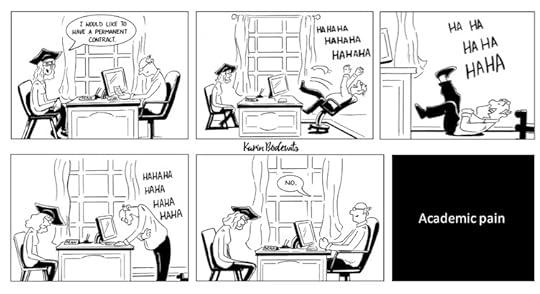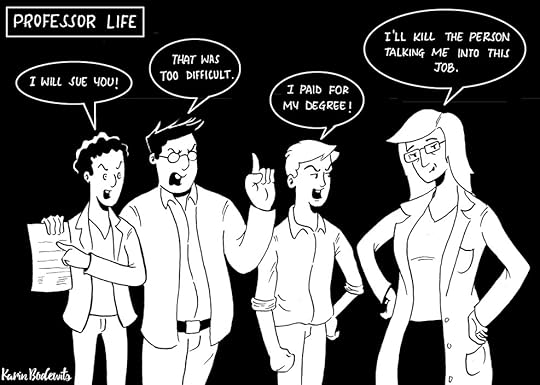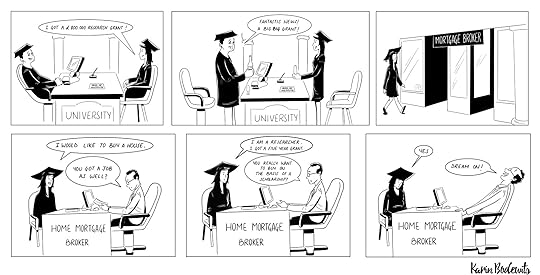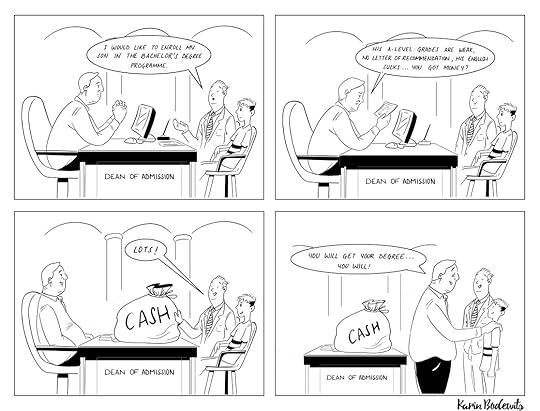Karin Bodewits's Blog
November 22, 2018
Scientists, please serve politics!
National Service should be reintroduced but with an experimental twist; rather than having all young men serve a stint in the armed forces, all scientists should serve in the farcical world of politics.
There is clearly no other way to rid politics of the endless, dreary, ill-informed, half-baked, pseudo-science which now litters public discourse. We need insiders, people with proven authority, people who can silence the gibberers with a simple, ‘That’s not even wrong…’
In days gone by we could say: ‘A politician’s background hardly matters, as long as she has read some history books, possesses a well-functioning brain, can bat off insults and stand her ground with fleetness of thought, a silver tongue and, hopefully, a smidgeon of integrity…’ Alas, science is now huge in politics. And, frankly, scientists are the only ones who can fully manage science. They are needed.
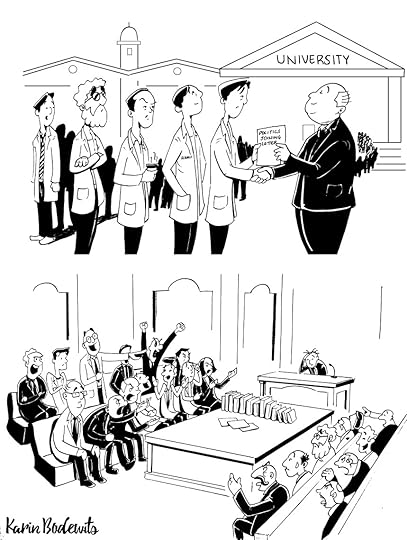
Nearly all the big moral and ethical questions in the world today involve science: climate change, death of the oceans, genetic modification of human cells, mini-killer robots, cyber wars, over-consumption of dead meat… to name just a few about which you can hear hysterical nonsense in the media any day of the week. The decisions about these challenges are being made by people who have no idea that a cucumber has genes. Of course, politicians are not stupid, or ignorant, but most have not studied life- or a natural science. They might come from perfectly honorable disciplines, and undoubtedly have their place in politics, but they might as well have studied Medieval Mongolian folk music for all it equips them to handle scientific debate.
It’s eating at the scientists. Many feel despair, impotent and even victimised in the face of political discourse that is just cobblers. Why can we not influence the future of our planet? Well, you can. Or you could if you were able to talk the talk. Unfortunately, the rhetorical skills required of political orators are anathema to people who cherish proven facts. The dubious morality of their discourse makes us sneer.
That we can’t influence where our planet is going is our own fault. We naively assumed that because proven scientific facts were important, politicians would knock on our doors for advice. What fools were we… Many politicians studied abstracts in which arguments were built upon chosen facts, subject to emphasis, phrasing and omission. Science is, well, science. You prove a thesis or you drop it and move on. Loud, constant and erudite repetition will help you not one jot when results in the lab completely contradict you. It is this skill, our knowledge and the acknowledgement of the lack thereof, that will make scientists good politicians…
Traditionally, the scientist is hothoused in the ivory tower, and that is all well and good. But for the sake of the future of mankind, now, the scientist must learn to flower outside it – in changing debate. It’s a quantum leap we must make. Universities do not encourage political engagement in science faculties, naturally. However, if we are to make sense of our fascinating world, on the cusp of so much scientific change, and to help it on its way, and avoid cataclysmic mistakes, then we need to have some grip on the reins of power. Universities should promote and support the political ambitions of scientists.
This will only stir some sense into political debates which currently dissolve into laughable humbug. Arguably, it is our duty to get stuck in and highlight the facts among the farcical. Otherwise we’re stuck on the sidelines snarling at screens and public figures, while feeling superfluous and frustrated.
Karin Bodewits
The post Scientists, please serve politics! appeared first on karinbodewits.com.
October 8, 2018
The story behind the story
When I finished my PhD, or maybe even before that point, I knew I had to write a warts-and-all account of my time at a world-renowned, British university. Certainly by then I had learned that the shabby morality, desperate deceits, undeserved qualifications, fiscal skulduggery and quasi-enslavements, which I witnessed, were not a given but also not unique.
 At Edinburgh University and at conferences abroad, I heard tales of woe that put my experience in the shade. And I read articles and heard stories from fellow disillusioned PhDs and identified with their shock, faint trauma and ironic laughter. The result is You Must be Very Intelligent which, perhaps inevitably, poured forth as a black comedy.
At Edinburgh University and at conferences abroad, I heard tales of woe that put my experience in the shade. And I read articles and heard stories from fellow disillusioned PhDs and identified with their shock, faint trauma and ironic laughter. The result is You Must be Very Intelligent which, perhaps inevitably, poured forth as a black comedy.
To an extent, the book is a cautionary tale to students contemplating a career in academia. I arrived in Edinburgh brimming with hope and positively overflowing with grit determination to prove I was worthy. After all, only the extraordinarily learned and the astonishingly intelligent ever hold chairs and professorships. I knew in my bones that researchers are idealists yearning to enrich the stock of human knowledge. I knew university is the apotheosis of civilised culture. I knew… very little…
The cliché, ‘you couldn’t make it up’ is most apposite. There really are people collecting degrees in subjects they know pretty much nothing about. But their parents know how to pay massive fees. There really are tin-pot dictators lording it over well-intentioned, bright students whose duties might include babysitting and might preclude precisely the research they were taken on to conduct. There really are people claiming credit for other people’s research and doing so quite brazenly. And there really are a lot of PhD students doing their utmost not to sink into alcohol, depression or bitterness. In the book, the protagonist’s life becomes a black farce.
There is nothing new about any of the afore-mentioned situations in academia. Universities have always been a competitive environment right from when they began, in Italy during the High Middle Ages (a logical progression from the Christian Cathedral schools for aspiring clergymen). My book does not bemoan this. It merely says the rot is rife, largely because of money and because there are no checks and balances on egomania and bullying. Fear stills tongues; to complain is to end your career.
Thankfully for many, being a good researcher can go hand in hand with being a talented leader, and a caring supervisor. But I saw the monsters beneath the meniscus of human nature surfacing in a world that is supposedly sedate and thoughtful but is all-too-often thoughtless and grasping. The terror of being randomly thrown on the scrapheap spawns frustrated egos the size of Africa. Pathological and completely illogical competition abounds. Volcanic rages seethe and faculty members are drunk on oh-such petty power. And it is, obviously, a deeply flawed system which unleashes these monstrous mind-states. How to fix it and how to treat next generations of young scientists is the big question modern universities need to face.
 You Must be Very Intelligent is not didactic, merely a descriptive, black comedy depicting a typical descent into depression, excessive wine and, naturally, ill-advised sex. I say I felt compelled to write it but it was not simply a matter of personal catharsis. Undoubtedly it is that too, but I hope it is also a clarion call for change. I still work with academia. I still believe it can work.
You Must be Very Intelligent is not didactic, merely a descriptive, black comedy depicting a typical descent into depression, excessive wine and, naturally, ill-advised sex. I say I felt compelled to write it but it was not simply a matter of personal catharsis. Undoubtedly it is that too, but I hope it is also a clarion call for change. I still work with academia. I still believe it can work.
At the moment, academia can too easily become an environment enticing young adults into roles that make Lord of the Flies look like Enid Blyton. Glory is the goal and desperation is the order of the day. An element of this has pervaded academia since time out of mind.
However, it’s a quantitative problem, not a qualitative one. In a nutshell it’s just too easy and too acceptable to behave like a monster. And the monsters – miserable creatures of course – earnestly believe this is the only way to survive.
Hopefully, You Must be Very Intelligent also works as solace and comfort for anyone who has ever aspired to life in the ivory tower and felt the cold hand of bitterness tapping their shoulder. It is written in a spirit of critical disillusionment rather than resignation. It is a warm-hearted story of hope gone awry, wherein passion and innocence are merrily bludgeoned by big egos, ludicrous farce, tawdry corruption, pimped-out brains and the sheer unreality of trying to be a grown-up in a brat’s world.
Ultimately it is, I hope, a revealing comic-tragic tale of the modern European university system; wherein money and power are the amoral Gods, and the noble search for truth quietly atrophies. It is also a cheerful rebuke to anyone who accepts that this state of affairs is inevitable or should be denied.
The post The story behind the story appeared first on karinbodewits.com.
June 6, 2018
Permanent contract in academia?
Professor life! When students pay high tuition fees….
June 4, 2018
Professor life! When students pay high tuition fees….
May 30, 2018
The academic at the mortgage broker
Mortgage broker – Bodewits
The post Mortgage broker – Bodewits appeared first on karinbodewits.com.
Buy your degree!
Money – Bodewits
The post Money – Bodewits appeared first on karinbodewits.com.
Head in sand – Bodewits
The post Head in sand – Bodewits appeared first on karinbodewits.com.

